Monday Feb 16, 2026
Monday Feb 16, 2026
Wednesday, 7 April 2021 00:02 - - {{hitsCtrl.values.hits}}
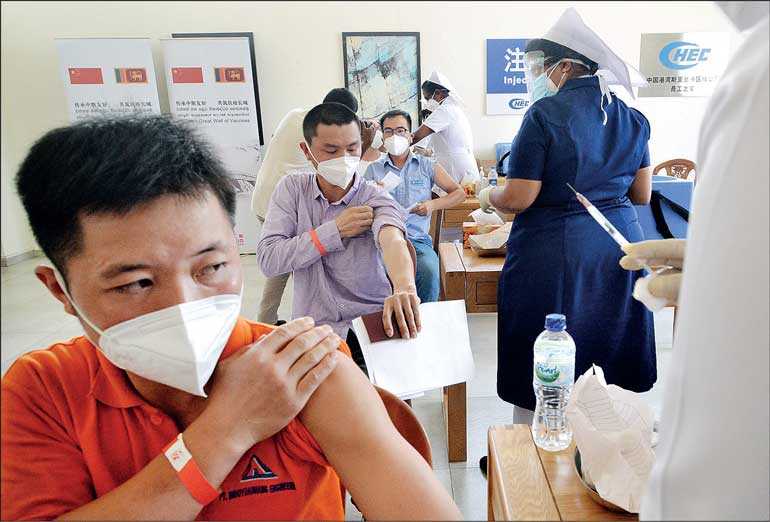
Chinese nationals in Sri Lanka receiving the Sinopharm vaccine. In the crucial early weeks, the Chinese Government focused not on controlling the spread of the virus but on repressing medical doctors warning about the virus. Now the sovereign Rajapaksas are kicking out the ‘gatekeepers’ and closing down free spaces to clear the way for Lankans to be used as experiment-subjects for a vaccine that is yet to be approved by the WHO – Pic by Shehan Gunasekara
“When elephants fight it is the grass that suffers” – African proverb
By Tisaranee Gunasekara
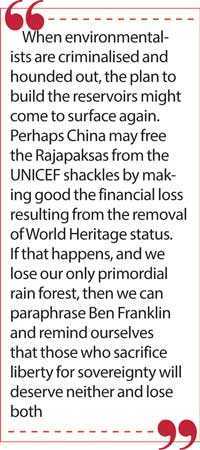 November 18, 2010. The second presidential investiture of Mahinda Rajapaksa took place against the backdrop of a massive sun, painted in the traditional Sinhala style, with a rotund face and a halo of curly rays. At the auspicious time, the sun parted and Mr Rajapaksa stepped out, followed by wife and sons.
November 18, 2010. The second presidential investiture of Mahinda Rajapaksa took place against the backdrop of a massive sun, painted in the traditional Sinhala style, with a rotund face and a halo of curly rays. At the auspicious time, the sun parted and Mr Rajapaksa stepped out, followed by wife and sons.
As drums rolled and conch shells sounded, he signed on the dotted line commencing his second presidential term. The previous evening he had opened the new seaport in Hambantota, named after himself. The first vessel to berth in the Magampura Mahinda Rajapaksa Port was a ship containing more than 250 Buddhist monks chanting the ‘Sagara Piritha’ (whatever that is).
Turning Hambantota into a shining city by the Indian Ocean was a Rajapaksa dream. In 2006, the Rajapaksas tried multiple sources, including India, for funds for a seaport, and drew a blank. China saw an opportunity and stepped in. This was a time before Xi Jinping and his Belt-and-Road fantasy, when China’s main concern and rival was India. China embraced Rajapaksa Sri Lanka for the same reason it embraced Pakistan, a chance to inveigle one more of India’s neighbours into its own sphere of influence, furthering its ambition of supplanting India as the pre-eminent land and maritime power in South Asia.
So the port was built. But the venture was bedevilled by bad planning and an absence of coordination. For example, the planning did not take into account a massive seabed rock obstructing the entrance to the port. Almost nine months after the gala inauguration of the port, the regime was forced to seek another loan from China (to the tune of $40 million) to remove the rock. Still, the port, like the Mattala Airport (which earned the dubious encomium of being the world’s emptiest airport) remained unproductive and unprofitable. The expected tens of thousands of ships didn’t materialise; nor did the promised 50,000 jobs.
The economic and financial disaster was neither unexpected nor unavoidable. For instance, according to a December 2006 WikiLeaks cable by the US Ambassador, “When asked, local officials say there have been no studies conducted on employment generation of the project. One official offered that there would probably be some indirect employment generated since there would be more people around to stay in hotels and eat in restaurants.” Local officials obviously understood the problems inherent in the port project. But the Rajapaksas, motivated by politics, driven by megalomania, were not inclined to ask for or listen to sober counsels.
Given the Rajapaksa’s level of knowledge and capacity to grasp facts, this is hardly surprising. The real questions are about China, which is neither ignorant nor slow on the uptake. Why did China pump money into venture after disastrous venture? Was it good hearted ignorance, because Beijing was at the beginning of a learning curve, as some of her apologists claim? Or was it playing the role of a predatory lender, allowing the Rajapaksas to sink deeper and deeper into a financial quagmire?
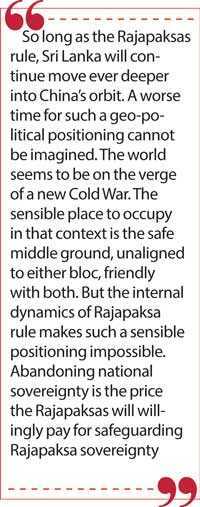 Rajapaksa sovereignty in an un-sovereign Sri Lanka
Rajapaksa sovereignty in an un-sovereign Sri Lanka
More than 90 years before “Columbus sailed the ocean blue,” Admiral Zheng He of China did so. During the first three decades of the 15th century, under the rule of the third Ming emperor, China became a burgeoning maritime power, intent on dominating the Indian Ocean and even venturing beyond into unknown seas. Admiral Zheng He’s treasure fleet undertook seven voyages. But the enterprise came to an abrupt end with the death of the emperor. China once again turned inwards, and remained so until the 20th Century.
What would have happened, had China continued with its maritime project? We have no way of knowing. But there is one incident which might provide a hint. One of Zeng He’s ports of call was Lanka. Greeted with less than cordiality by Veera Alakeshwara, the de facto ruler of Kotte kingdom, Zeng He departed, returned (probably with reinforcements), attacked Kotte and took the impudent Lankan ruler prisoner.
As China re-embraces its maritime ambitions, Admiral Zeng He has been cast into limelight. In a laudatory article about him, the official Chinese paper, Peoples’ Daily, had this to say about his Lankan adventure. “In Ceylon (Sri Lanka), his men took an insubordinate ruler and replaced him with the legitimate malleable one” (http://en.people.cn/90001/98705/100621/7342090.html). Interesting choice of words, equating insubordinate with illegitimate and malleable with legitimate, something the Rajapaksas could wholeheartedly agree with.
“In Sri Lanka, an era of ‘ruler kings’ has begun,” exulted Basil Rajapaksa one year after his brother’s second presidential investiture. “Western ideas of transparency...along with limits of presidential power and accountability are not relevant to ‘Asian Culture’” (The Economist – November 2011). The Rajapaksas want to hog every scrap of power in familial hands and transfer that power from brother to brother, and uncle to nephew. Given this domestic agenda, their utter affinity with China is understandable. With China, there is no talk of devolution or human rights. In Geneva, last month, China put up a vociferous defence of Rajapaksas’ human rights record while Sri Lanka backed China on the issue of Uyghurs.
So long as the Rajapaksas rule, Sri Lanka will continue move ever deeper into China’s orbit. A worse time for such a geo-political positioning cannot be imagined. The world seems to be on the verge of a new Cold War. The sensible place to occupy in that context is the safe middle ground, unaligned to either bloc, friendly with both. But the internal dynamics of Rajapaksa rule makes such a sensible positioning impossible. Abandoning national sovereignty is the price the Rajapaksas will willingly pay for safeguarding Rajapaksa sovereignty.
An incident that happened during the Mahinda Rajapaksa presidency provides a disturbing forewarning of our fate in a new Cold War. In 2014, then Prime Minister D.M. Jayaratne visited Vietnam to participate in an official Vesak celebration. This was a time of high tension between Hanoi and Beijing consequent to China National Offshore Oil Corporation building an oil rig in the disputed-waters of the South China Sea. PM Jayaratne was reported in Vietnam media expressing Colombo’s support for Hanoi. Within a few hours, the Chinese Ambassador in Colombo publicly stated Beijing’s concern at Lankan Prime Minister’s comments. Sri Lanka’s External Affairs Ministry rushed to contradict Lankan PM.
Back home, the PM himself had to deny his own words in the presence of the Chinese Ambassador. A senior official of the PM’s office stated that the PM ‘did not utter a single word against China’ and that Vietnamese media ‘misrepresented’ his remarks. To make Colombo’s fealty to Beijing clear, President Rajapaksa himself assured a visiting Chinese delegation ‘of Sri Lanka’s support in international and regional matters such as One-China policy and with matters pertaining to the South China Sea’ (Colombo Page – 16 May 2014).
So even in 2014, Rajapaksa Sri Lanka’s sovereignty was conditional on not taking a stance displeasing to China. One-and-a-half years into Gotabaya-Mahinda rule, Colombo’s dependence on Beijing is infinitely greater, further reducing its capacity to say no to China. Given this context, the question cannot but arise whether Sri Lanka’s invitation to the military junta of Myanmar for BIMSTEC was due to ignorance, ineptitude or a more insidious reason.
Last week, the junta made its first foray beyond its borders by actually participating in the BIMSTEC virtual meeting even as its forces continued to butcher unarmed civilians (including more than 30 children), a practice it had perfected on the Rohingya minority. Lanka’s palling with the junta government is interesting given China’s own nebulous stand. When the coup happened, Xinhua called it a “major cabinet reshuffle”. Beijing has also blocked a UN Security Council resolution condemning the coup.
Last year, the US Secretary of State and the Chinese Embassy in Colombo engaged in an unprecedented verbal spat over Sri Lanka’s place in the world. Perhaps it is apposite to remember that the brunt of the old Cold War was borne not by the principals but by their client states in the Tricontinental world. Pawns die first and no one mourns them.
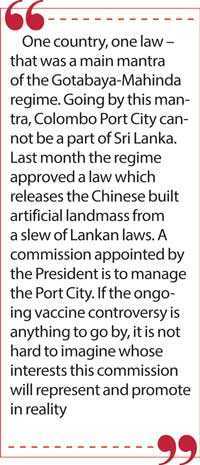 The Sinopharm controversy and the wages of dependency
The Sinopharm controversy and the wages of dependency
One country, one law – that was a main mantra of the Gotabaya-Mahinda regime. Going by this mantra, Colombo Port City cannot be a part of Sri Lanka. Last month the regime approved a law which releases the Chinese built artificial landmass from a slew of Lankan laws. A commission appointed by the President is to manage the Port City. If the ongoing vaccine controversy is anything to go by, it is not hard to imagine whose interests this commission will represent and promote in reality.
Last month, the National Medicines Regulatory Authority (NMRA) refused to sanction the emergency use of Chinese-made Sinopharm vaccine, pointing out that the manufacturing company has failed to provide adequate data pertaining to the third trial. This stance was based on a report by the NMRA’s expert committee which expressed concerns about the efficacy and the safety of the vaccine. In other words, about the lives of Lankans.
The regime promptly sacked four NMRA members. The Chairman resigned in protest. The Government then stocked the NMRA with its own appointees. The newly-minted NMRA approved the emergency use of Sinopharm vaccine. Last week, the only member of the new NMRA to oppose the ruling was also booted out.
Consultant Paediatrician Dr. Lak Kumar Fernando, the nominee of the Sri Lanka College of Paediatricians, had objected to the use of his fellow countrymen and women as guinea-pigs by the vaccine maker. According to Dr. Fernando, “We as gatekeepers must ensure the protection of the people for whom we are doing this as a service” (The Sunday Times – 4 April 2021).
The Sri Lanka Medical Association (established in 1887) has issued a statement asking the Government to abide by expert opinions. “We have been reliably informed that attempts are being made to overturn that decision and register the said vaccines for emergency use... We wish to emphasise to the Government of Sri Lanka the need to make decisions based only on scientific evidence for optimum control of the Covid-19 infection. Assuring a background for freedom for decision making at NMRA with no other outside influence would be of paramount importance in this regard.”
The Association of Medical Specialists said: “We also note with great anxiety and dismay of certain arbitrary appointments and removals being made to the NMRA Board. We strongly believe such moves as an attempt to undermine the scientific basis of vaccine approval and hence its safety, efficacy and acceptance by the general public.”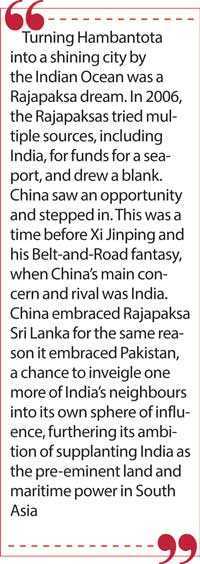
Unfortunately, in an unfree country, there cannot be islands of freedom even for medical science and gatekeepers are criminalised. That was how the chance of containing the COVID-19 epidemic was lost in China. In the crucial early weeks, the Chinese Government focused not on controlling the spread of the virus but on repressing medical doctors warning about the virus. Now the sovereign Rajapaksas are kicking out the ‘gatekeepers’ and closing down free spaces to clear the way for Lankans to be used as experiment-subjects for a vaccine that is yet to be approved by the WHO.
What happened to Shani Abeysekara, what is happening to Eric Perera and Devani Jayathilaka is no anomaly but the way of the future. Anyone who opposes the Rajapaksas, their acolytes or their paymasters will be treated with zero-tolerance, be it a medical doctor or a journalist, a police officer or a wildlife official. Injustice and impunity are radical things, forces which do not respect the boundaries we create to keep ourselves safe from general calamities.
The fate of Sinharaja will be a critical test. The 15,000 acre industrial zone China is planning to build to make the Hambantota Port commercially viable (talk of a vicious spiral) needs water. The Government seems to have abandoned the plan to construct reservoirs in or near Sinharaja, due to UNICEF’s inevitable opposition. But this is a feint. A propaganda war has been launched, trying to demonise and criminalise environmentalists.
The SLPP Secretary has said that those spreading stories about environmental destruction could be drug lords. “Environmentalists are NGOs. I have now found out what these NGOs are, where they get the money, what their objective is. They are giving money and getting (people) agitated,” claimed Chamal Rajapaksa (Lanka News Web – 2 April 2021).
The Mahinda Rajapaksa Information Centre issued a statement labelling as extremists those who oppose infrastructure projects. It may not be long before environmental activists are arrested for crimes imagined by those police officials whose loyalty is not to the law but to “our Government”.
When environmentalists are criminalised and hounded out, the plan to build the reservoirs might come to surface again. Perhaps China may free the Rajapaksas from the UNICEF shackles by making good the financial loss resulting from the removal of World Heritage status. If that happens, and we lose our only primordial rain forest, then we can paraphrase Ben Franklin and remind ourselves that those who sacrifice liberty for sovereignty will deserve neither and lose both.